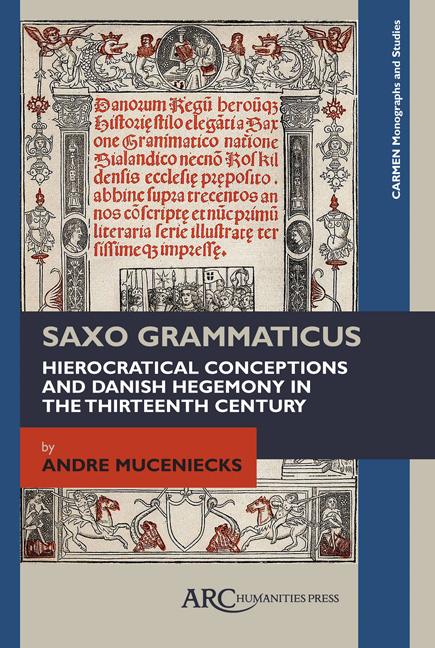Book contents
- Frontmatter
- Contents
- List of Illustrations
- Acknowledgements
- Foreword
- Preface
- Chapter 1 Denmark and the Baltic in the Thirteenth Century
- Chapter 2 The Work
- Chapter 3 Political Conceptions
- Chapter 4 Euhemerism and the East in Saxo Grammaticus
- Chapter 5 Virtues and Values in Saxo Grammaticus: The Four Cardinal Virtues
- Chapter 6 The Thematic of the Counsellor
- Conclusion
- Appendix 1 List of the Kings in Books I–VIII of the Gesta Danorum
- Appendix 2 Rulers and Archbishops of Denmark in Relation to Events in the Baltic, the Empire, and the Papacy
- Appendix 3 Genealogy of the Valdemarian Kings
- Bibliography
- Index of Persons
- Index of Places and Peoples
- Index of Authors and Primary Sources
- Index of Subjects
Foreword
Published online by Cambridge University Press: 15 January 2021
- Frontmatter
- Contents
- List of Illustrations
- Acknowledgements
- Foreword
- Preface
- Chapter 1 Denmark and the Baltic in the Thirteenth Century
- Chapter 2 The Work
- Chapter 3 Political Conceptions
- Chapter 4 Euhemerism and the East in Saxo Grammaticus
- Chapter 5 Virtues and Values in Saxo Grammaticus: The Four Cardinal Virtues
- Chapter 6 The Thematic of the Counsellor
- Conclusion
- Appendix 1 List of the Kings in Books I–VIII of the Gesta Danorum
- Appendix 2 Rulers and Archbishops of Denmark in Relation to Events in the Baltic, the Empire, and the Papacy
- Appendix 3 Genealogy of the Valdemarian Kings
- Bibliography
- Index of Persons
- Index of Places and Peoples
- Index of Authors and Primary Sources
- Index of Subjects
Summary
AS ALREADY POINTED out by many people, the Gesta Danorum, written by the Danish historian Saxo Grammaticus, has been the subject of an immense amount of scholarly investigation for several centuries. Despite this, new aspects can still be added to the edifice of the work and its mythical as well as historical contents. The present book, unusual in that it has been written in Brazil yet deals with Northern Europe in the Middle Ages, contributes to both of the aforementioned aspects of Saxo's work with the help of clearly-defined points of departure and questions at issue.
The book can be said to consist of two main parts, even if this is not explicitly stated. The first four chapters form a broad contextualizing background for chapters 5 and 6, in which the author's own, new contributions to research on Saxo are primarily found. Even if the contextualizing parts are mostly informative, they contain valuable and interesting observations made by the author that go beyond merely reproducing what is already known. For instance, by using mainly sources other than Saxo's own work to describe the Northern German and Danish expansion in the Baltics from a chronological perspective, the author brings the contents of the Gesta into full relief. Thus, these parts of the book are more than a mere study of Saxo's work as an historical narrative. Placed in this broader perspective, it is possible to understand the author's comprehensive and stimulating treatment of Saxo, his sources of inspiration, his text, and its composition. The author undertakes interesting comparisons with the different narratives contained in Icelandic historical texts and their writers’ respective knowledge of the Baltics. It appears that Saxo had better knowledge that might be expected, but also that he had another aim and direction concerning his narrative, viz. to defend Danish hegemony in the Baltic area as seen in the light of the Northern Crusades.
Undeniably, the four so-called cardinal virtues, fortitudo, iustitia, prudentia, and temperantia, played an important role in medieval theology and moral philosophy. However, they are not easily translated into modern English. Despite this fact, they can open up a better understanding of the composition of Saxo's work, and for this reason they have been used in earlier research as a sort of structuralizing instrument that can be put onto the descriptions in the Gesta Danorum, or at least parts of them.
- Type
- Chapter
- Information
- Saxo GrammaticusHierocratical Conceptions and Danish Hegemony in the Thirteenth Century, pp. x - xiPublisher: Amsterdam University PressPrint publication year: 2017



